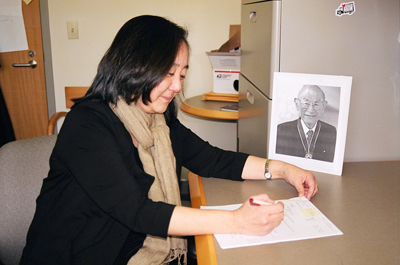 Seattle University School of Law Professor Lorraine Bannai writes notes for an upcoming biography of civil rights leader Fred Korematsu. Photo by James Tabafunda
|
By James Tabafunda
Northwest Asian Weekly
When Fred Korematsu, a Japanese American welder, dared to challenge the constitutionality of his internment in 1942, his objections fell on deaf ears. He faced an overwhelming majority that preferred putting him behind barbed wire with armed guards instead of dealing with the issues of prejudice and war hysteria.
In 2008, three years after his death — at age 86 — a group of law school professors decided to continue his dedicated fight for justice. They will officially launch the Fred T. Korematsu Center for Law and Equality on April 18 at Seattle University’s School of Law.
The event is called “Looking Back, Reaching Forward.” It features the following presentations: “The Historic Struggle for Equality,” “How the Lessons of the Past Inform the Present,” and “Reaching Forward: A Discussion between Academics and Advocacy Organizations.”
“When the opportunity came to name it after Fred Korematsu, we decided it should be a positive message so it’s for law and equality,” said Professor Robert Chang, the center’s director.
He also noted that the name strengthens a unique center that has three, equal components: “a think tank, advocacy efforts, and educational initiatives.”
“This new center allows for our talented faculty to build on the law school’s strengths in the areas of race and the law to advance our mission for a more just and humane world,” said Kellye Testy, dean of the university’s School of Law.
“The center is committed to working towards equality in a wide range of issues,” said Professor Lorraine Bannai, the center’s associate director and member of Korematsu’s legal team. In addition to race, it will address issues regarding sexuality, gender, class, disability and religion.
The new center follows the 2006 opening of two California schools previously named in his honor: the Fred T. Korematsu Discovery Academy, in Oakland, and the Davis-based Fred T. Korematsu Elementary School, at Mace Ranch.
Korematsu decided not to follow President Franklin Roosevelt’s Executive Order 9066 after the Pearl Harbor bombing because he wanted to live free. “He was very much about fighting for equality wherever that fight needed to happen,” said Bannai.
He was arrested in San Leandro, Calif., for violating Public Law 503 — ratifying Executive Order 9066. He was convicted and sent to prison, and he later was sent, along with 120,000 others of Japanese ancestry, to an internment camp. Korematsu was taken to the Topaz internment camp in central Utah. His case reached the U.S. Supreme Court in 1944. The 6–3 decision in Korematsu v. United States ruled that Executive Order 9066 was constitutional.
The April 18 launch will also commemorate the 25th anniversary of the overturning of his conviction by the Federal District Court for the Northern District of California.
Even after the clearing of his name, Korematsu later continued to speak out against the racial profiling of Arab Americans after 9/11. Bannai said the center is “a way of carrying on Fred’s legacy of fighting for equality for all people.”
In recognition of his lifelong dedication to social justice, Korematsu received the Presidential Medal of Freedom — the nation’s highest civilian honor — from President Bill Clinton in 1998.
“For all of us, we continue speaking about Fred’s case across the country because we felt very strongly from the beginning that this was not just a legal case,” said Bannai. “This was a case that had to be tried in the court of public opinion.”
She adds that raising public awareness about what happened to Korematsu is one of the best ways to “gain a measure, a sense that this wouldn’t happen again.” ♦
The Fred T. Korematsu Center for Law and Equality will be launched at Seattle University’s Sullivan Hall on April 18, from 8:15 a.m.–5:30 p.m. For more information, visit www.law.seattleu.edu or call 206-398-4300 by April 8.
James Tabafunda can be reached at info@nwasianweekly.com.



